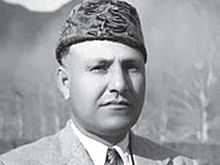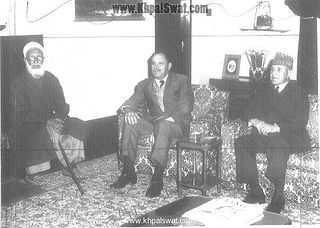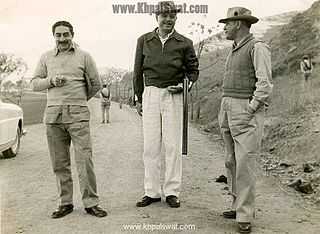Miangul Jahan Zeb
| Miangul Jahanzeb | |
|---|---|
 | |
| Born |
5 June 1908 House of Miangul Abdul Wadud |
| Died |
14 September 1987 (aged 79) Saidu Shari |
| Residence | Saidu Sharif, Swat |
| Nationality | Pakistani |
| Other names | Wali Swat |
| Alma mater | Islamia College, Peshawar |
| Title | Wali of Swat (1949–1969) |
| Awards | 15-gun salute |
Miangul Jahan Zeb (ميانگل جهان زيب: اردو) (1987–1908), Gujar, formally Miangul Abdul-Haqq Jahan Zeb was former ruler of the princely state of Swat currently part of Pakistan and formally titled the Wāli. He served as the Wāli of Swat between 1949 and 1969, taking over from his father, Miangul Abdul Wadud(Badshah Sahib). He is remembered for the hard work he put into building schools, hospitals and roads for his people, but also for his absolute rule over the region, which ended when Pakistan took control after local unrest.[1][2][3] Jahan Zeb was also a conscientious protector of the landmarks of previous cultures.[4]

Early life and education
Major-General His Highness. Miangul Abdul Haq Jehanzeb, Ghazi-i-Millat, Wali of Swat, born at Saidu-Sharif, on 5 June 1908, was the eldest son of H.H. Miangul Gulshazada Sir Abdul Wadud, Wali of Swat. He was educated in Islamia Collegiate school and Islamia College, Univ. of Peshawar, 1923. He has four sons and one daughter.[5]
1)H.H. Miangul Aurangzeb, WaliAhad of Swat,(Former Governor of Khyber Pakhtunkhwa&Governor of Balochistan)
2)Miangul Shahzada Alamzeb (father of Miangul Akbarzeb, Pakistani High Commissioner to Canada)
3)Miangul Shahzada Amirzeb.Member of the National Assembly of Pakistan 1977.[6]
4)Miangul Shahzada Ahmedzeb (spouse of Mussarat Ahmed Zeb)
Political Career
H.H Miangul Jahanzeb was appointed as successor (Wali Ahad)" in 1933. His father,Miangul Abdul Wadud (Wali of Swat) abdicated in favour of his eldest son (Miangul Jahanzeb), whom he had carefully educated along modern lines, and gradually trained up to assume the full burdens of the government. He was enthroned as Wali of Swat on 12th December,1949[7] and granted the title of Ghazi-e-Millat(1951) and a hereditary salute.

His system of administration
The Wali headed each department of his administration.[8] His role was that of king and religious leader, chief minister and commander-in-chief, chief exchequer and head qazi.[7] He ensured that his government provided:
1) good administration and productive revenue collection
2) a judicial system that provided quick and free justice to all.
3) a qala(forts) system that provided security and protection to the people
4) grassroots developments, centred on jobs, welfare, education and health services to all
5) Finally instant communication through roads, bridges, and telegraph and penal codes provided complete rule of law; and telephones and informers that kept the Wali informed of the latest developments. This was a unique system of administration.[9]
Patronage of education
He surpassed the other contemporary rulers in the field of education. Before Jahanzeb’s era, Swat did not have a modern education system. Bacha Sahib laid the foundations of the modern education system in Swat, which was rapidly developed by his son later on. The Wali founded a girls' high school in Saidu Sharif which is the first female educational institution in swat.[7] Jahanzeb College for Men has the importance of Alligarh College in the entire Malakand division. He also established a missionary school at Sangota for girls.[10] For his unending love for knowledge he was given the title of Sultanul Uloom (master of knowledge) by the people of Swat.
Preservation of civilization and culture
Jahan Zeb was also a conscienscious protector of the landmarks of previous cultures.[4] In the era of the last Wali of Swat State Miangul Abdul Haq Jahanzeb, the ruins were protected and preserved. The ruler had also signed an agreement with the Italian government for exploring ruins. The Swat Museum was also built under his rule in 1959. The museum contains some of the finest collections of Gandhara art, including magnificent pieces of Buddhist sculpture. The Wali knew the importance of culture and heritage and during his time, cultural dance shows and festivals on Eid were conducted under the government's patronage. The architectural style unique to Swat was maintained and the buildings were provided with all basic facilities.[10]
Foreign relations
Foreign Heads of State and VIPs became regular visitors to the valley, and the Wali became a frequent player on the national stage. In 1961 the Queen of England- Elizabeth II, as a guest of the Wali, had loved Swat and called it "The Switzerland of the East".[9] The first prime Minister of Pakistan Liaqat Ali Khan also visited Swat to attend the coronation ceremony of the Wali.
Honours and awards
Source:[11]
• Hon, Major General, Pakistan Army, 1955
• Hon. LL.D. (University of Peshawar) 1965
• Pakistan Independence (1948) medals
• The Orders of Pakistan 2nd class (Hilal-i-Pakistan) (1961)
• Great Leader (Hilal-i-Quaid-i-Azam) (1959)[12]
• Hilal-i -Humayun 1st class of Iran
• GO of the Order of Merit of the Republic of Italy
• Silver Jubilee (1935)
• 15 Guns solute(1958)
Death
He died on 14 September 1987 at Saidu Sharif.[13] His funeral was attended by the then Prime Minister of Pakistan, Muhammad Khan Junejo, Governor, NWFP and other high officials. He was buried in his ancestral graveyard at Saidu Sharif.
See also
- Swat (princely state)
- Wali of Swat
- Miangul Aurangzeb
References
- ↑ "What is Swat all about?". viewpointonline.net. Retrieved 20 April 2014.
- ↑ Massingberd, H. The Very Best of the Daily Telegraph Obituaries (Pan 2001), pp.26–8
- ↑ 4.0 4.1 Swat’s Gandhara heritage waits to be protected Fazal Khaliq, 21 July 2010
- ↑ www.royalark.net/Pakistan/swat.htm
- ↑ Notification. "Miangul Amirzeb" (PDF). National Assembly of Pakistan. Retrieved 13 May 2014.
- ↑ 7.0 7.1 7.2 Aamir, Riaz (5 July 2009). "Malakand under Siege". Daily Jang, Rawalpindi. Retrieved 20 April 2014.
- ↑ Rome, Sultan. "Administrative System of the Princely State of Swat". valleyswat.net. Retrieved 15 January 2014.
- ↑ 9.0 9.1 Jilani, zebun-Nisa; Zeenat Ahmad. "Our Swat – Gone with the Wind". Swat relief initiative.
- ↑ 10.0 10.1 Fazal Khaliq (26 September 2011). "Last ruler of Swat: Jahanzeb, a visionary who educated and loved his people". The Express Tribune. Retrieved 15 January 2014.
- ↑ "About Swat Royal Family & Photographs". Apnaswat.com. 16 November 2010. Retrieved 16 February 2014.
- ↑ "Decoration of medals Pakistan".
- ↑ www.valleyswat.net/literature/papers/Administrative_System_of_Swat.pdf
External links
Further reading
• Dr. Sultan-I-Rome, Swat State under the Walis (1917–69), Ph.D. Dissertation, P 28-35
• Miangul Jehanzeb, The Last Wali of Swat, as told to Fredrik Barth. Norwegian University Press/Universitetsforlaget AS, Oslo, 1985